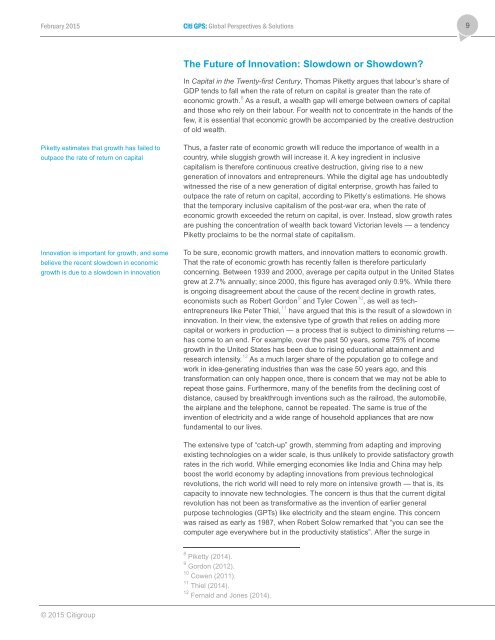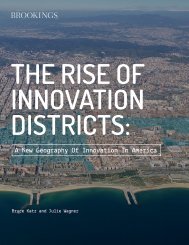TECHNOLOGY AT WORK
1Oclobi
1Oclobi
Create successful ePaper yourself
Turn your PDF publications into a flip-book with our unique Google optimized e-Paper software.
February 2015<br />
Citi GPS: Global Perspectives & Solutions<br />
9<br />
Piketty estimates that growth has failed to<br />
outpace the rate of return on capital<br />
Innovation is important for growth, and some<br />
believe the recent slowdown in economic<br />
growth is due to a slowdown in innovation<br />
The Future of Innovation: Slowdown or Showdown?<br />
In Capital in the Twenty-first Century, Thomas Piketty argues that labour’s share of<br />
GDP tends to fall when the rate of return on capital is greater than the rate of<br />
economic growth. 8 As a result, a wealth gap will emerge between owners of capital<br />
and those who rely on their labour. For wealth not to concentrate in the hands of the<br />
few, it is essential that economic growth be accompanied by the creative destruction<br />
of old wealth.<br />
Thus, a faster rate of economic growth will reduce the importance of wealth in a<br />
country, while sluggish growth will increase it. A key ingredient in inclusive<br />
capitalism is therefore continuous creative destruction, giving rise to a new<br />
generation of innovators and entrepreneurs. While the digital age has undoubtedly<br />
witnessed the rise of a new generation of digital enterprise, growth has failed to<br />
outpace the rate of return on capital, according to Piketty’s estimations. He shows<br />
that the temporary inclusive capitalism of the post-war era, when the rate of<br />
economic growth exceeded the return on capital, is over. Instead, slow growth rates<br />
are pushing the concentration of wealth back toward Victorian levels — a tendency<br />
Piketty proclaims to be the normal state of capitalism.<br />
To be sure, economic growth matters, and innovation matters to economic growth.<br />
That the rate of economic growth has recently fallen is therefore particularly<br />
concerning. Between 1939 and 2000, average per capita output in the United States<br />
grew at 2.7% annually; since 2000, this figure has averaged only 0.9%. While there<br />
is ongoing disagreement about the cause of the recent decline in growth rates,<br />
economists such as Robert Gordon 9 and Tyler Cowen 10 , as well as techentrepreneurs<br />
like Peter Thiel, 11 have argued that this is the result of a slowdown in<br />
innovation. In their view, the extensive type of growth that relies on adding more<br />
capital or workers in production — a process that is subject to diminishing returns —<br />
has come to an end. For example, over the past 50 years, some 75% of income<br />
growth in the United States has been due to rising educational attainment and<br />
research intensity. 12 As a much larger share of the population go to college and<br />
work in idea-generating industries than was the case 50 years ago, and this<br />
transformation can only happen once, there is concern that we may not be able to<br />
repeat those gains. Furthermore, many of the benefits from the declining cost of<br />
distance, caused by breakthrough inventions such as the railroad, the automobile,<br />
the airplane and the telephone, cannot be repeated. The same is true of the<br />
invention of electricity and a wide range of household appliances that are now<br />
fundamental to our lives.<br />
The extensive type of “catch-up” growth, stemming from adapting and improving<br />
existing technologies on a wider scale, is thus unlikely to provide satisfactory growth<br />
rates in the rich world. While emerging economies like India and China may help<br />
boost the world economy by adapting innovations from previous technological<br />
revolutions, the rich world will need to rely more on intensive growth — that is, its<br />
capacity to innovate new technologies. The concern is thus that the current digital<br />
revolution has not been as transformative as the invention of earlier general<br />
purpose technologies (GPTs) like electricity and the steam engine. This concern<br />
was raised as early as 1987, when Robert Solow remarked that “you can see the<br />
computer age everywhere but in the productivity statistics”. After the surge in<br />
8 Piketty (2014).<br />
9 Gordon (2012).<br />
10 Cowen (2011).<br />
11 Thiel (2014).<br />
12 Fernald and Jones (2014).<br />
© 2015 Citigroup










